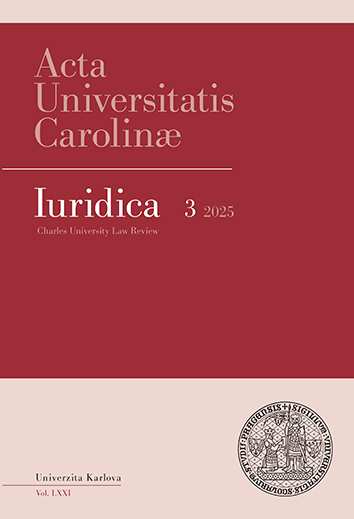Acta Universitatis Carolinae Iuridica (AUCI) is the main journal of the Faculty of Law of Charles University. It has been published since 1954 and is one of the traditional law journals with a theoretical focus.
As a general law journal, it publishes longer studies and shorter articles on any relevant issues in legal theory and international, European and national law. AUCI also publishes material relating to current legislative issues. AUCI is a peer-reviewed journal and accepts submissions from both Czech and international authors. Contributions by foreign authors are published in their original language – Slovak, English, German, French.
AUCI is a theoretical journal for questions of state and law. It is published by Charles University in Prague, Faculty of Law, through Karolinum Press. It is published four times a year, the dates of publication can be found here.
Articles published in AUCI undergo an independent peer review process, which is anonymous on both sides. Reviewers from the field give their opinion on the scientific quality of the paper and the suitability of publication in the journal. In the case of comments, the opinion is sent back to the author with the possibility of revising the text (see Guidelines for Authors – Per Review Process for more details).
The AUCI journal (ISSN 0323-0619) is registered in the Czech National Bibliography (kept by the National Library of the Czech Republic) and in the Index to Foreign Legal Periodicals (kept by the American Association of Law Libraries). AUCI has been assigned a periodical registration number MK E 18585.
In 2021 the journal AUCI was the first journal of the Faculty of Law of Charles University to be included in the prestigious international database Scopus. This Elsevier database is the largest abstract and citation database of peer-reviewed literature in the world. The editors of the journal expect from the inclusion in the elite Scopus database not only an increase in the readership of the journal, but also an increase in interest in the publication of papers by both Czech and foreign authors.
AUCI is an open journal and all its content is published both on the faculty website and on the Karolinum Press website. Access to it is free of charge. The homepage of AUCI is on the Karolinum Press website.
The AUCI journal uses the Creative Commons license: CC BY 4.0.
Long-term archiving of the digital content of the journal is provided by Portico.
AUC IURIDICA, Vol 37 No 2 (1991), 3–18
Politické kluby a společnosti ve Francii za Velké francouzské buržoazní revoluce
[Political Clubs and Societies During the French Revolution]
Stanislav Balík
DOI: https://doi.org/10.14712/23366478.2025.373
published online: 20. 03. 2025
abstract
In the course of the French Revolution revolutionary clubs and societies were subjected to a complicated development during which their position, their goals and importance was modified. As unrestraintly built organisms they reflected in the first years of the Revolution – we may say – a certain political pluralism. On the whole they became an effective instrument of the Revolution and they helped revolutionary forces not only to conquer the king and to the formation of the Republic but even to further the development of the Revolution. Under the Girondists and Jacobins their position and goals changed. It is mainly so because they more or less integrated with administrative organs or they even took over their function and tasks. At this time, when the people’s societies and clubs cease to be spontaneous organisms and change into more or less directed organs and instruments of the revolutionary government, certain hidden negative factors start to work. They are the oppression of the political pluralism and its substitution by one movement or as we would say today by the rule of one party, the decline of the spontaneous people’s activity and independence, the gradual “sclerotization” of structures and methods, that are becoming more and more formal etc. These negative factors, together with the consequences of the fights among fractions in the Jacobin movement naturally lead to a significant narrowing and weakening of the social basis not only of the Jacobin movement and of the revolutionary people’s societies but of the Revolution as a whole, resulted in a crisis of the trust and of the weakening of the activity of the people’s societies. This all opened the way to the coup d’état of 9 Thermidor. After this upheaval the activity of the Jacobin club was forbidden, the people’s societies were gradually encroached and forbidden even if some of them after their prohibition worked illegally. The attitude of the Directory to clubs and societies was not explicit. To a certain extent it depended on the specific situation, whether the Directory was endangered from the right or from the left.

Politické kluby a společnosti ve Francii za Velké francouzské buržoazní revoluce is licensed under a Creative Commons Attribution 4.0 International License.
230 x 157 mm
periodicity: 4 x per year
print price: 65 czk
ISSN: 0323-0619
E-ISSN: 2336-6478
